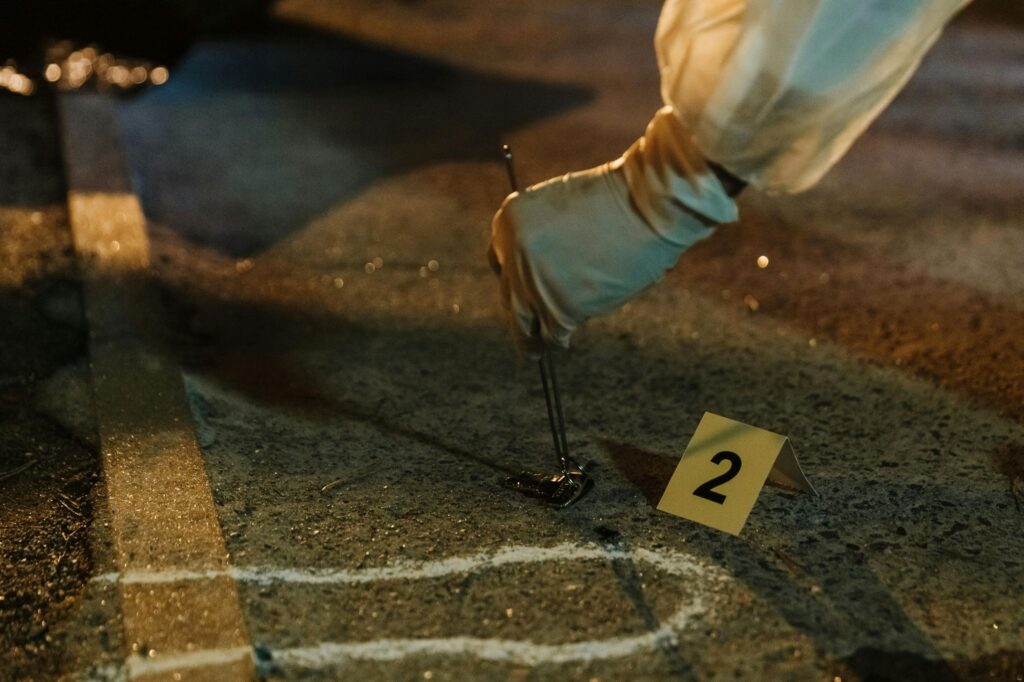Key takeaways
- Several factors dictate the answer to how much do crime scene investigators make an hour.
- Crime scene investigators collect, preserve, and analyze data, which plays a crucial role in criminal investigations.
- Job responsibilities include investigating an active crime scene, taking photographs of the crime, collecting and documenting evidence, analyzing evidence, writing reports, and more.
- The answer to how much does CSI agents make is different on different job hunt platforms.
- The average annual salary of a crime investigator is $91,100 as per BLS.
- Educational qualifications, skill set, area of specialization, and work experience are some factors that dictate the answer to how much do CSI agents make a year.
- A bachelor’s degree in forensic science or a degree in criminology, biology, chemistry, or related field with a major in forensic science is the required education for CSI agents.
Crime Scene Investigators play a pivotal role in the criminal justice system. They are responsible for collecting, preserving, and analyzing evidence from crime scenes to find irrefutable evidence and facts about the crime. Their findings help shape the narrative of criminal investigations, uncover the truth, and enable detectives to aid criminal justice administration. Those interested in pursuing a career as a crime scene investigator are often interested in how much do crime scene investigators make an hour.
In this guide, you will not only find the average CSI salary but also obtain information about the job, roles, responsibilities, required skills and education, and factors affecting earning potential. But before we discuss a crime scene investigator’s salary, let us first define what a crime scene investigator is.
What is a crime scene investigator?

A crime scene investigator is usually the first person at the crime scene right after the crime is reported to the police. Their task is to collect all possible evidence from the scene, such as fingerprints, DNA, fluid samples, and so on, before the area is contaminated and other investigating officers reach the scene. They secure all collected evidence in bags or appropriate storage containers and transport them to crime laboratories or testing sites. Moreover, CSI professionals collaborate with forensic science technicians, detectives, and other professionals to aid criminal investigations.
Generally, crime scene investigators work standard working hours but they are never truly off duty as there is no set time for a crime to take place. Moreover, a crime scene investigator must be able to undertake roles and responsibilities in a variety of settings, including field work, laboratory work, documentation, and reporting.
Tasks and responsibilities of CSI
The tasks and responsibilities of a crime scene investigator are vast and vary depending on the nature of the job and the nature of the crime. The protocol or the responsibilities at a murder site are significantly different from the evidence-gathering protocol at a robbery. Here are some major tasks and responsibilities of a CSI:
- Investigate active crime scene
- Photographing the crime scene
- Collecting evidence at the crime scene
- Documentation
- Report writing
- Research and analysis
- Testifying in court
- Documenting autopsies
- Managing evidence
Average crime scene investigator salary
The United States Bureau of Labor Statistics provides a detailed analysis of detectives and crime scene investigators. As per the Bureau’s findings, the average crime scene investigator’s annual salary is $95,930. However, it is important to note that this is a nationwide average of individuals employed at all levels and with varying levels of experience, educational qualifications, and skills. These are the factors that affect a CSI agent’s salary.
The table below will provide more information on a CSI detective’s salary as well as answer the question: how much do crime scene investigators make an hour?
| How much do crime scene investigators make? | |||||
| Percentile | 10% | 25% | 50% | 75% | 90% |
| Hourly wage | $24.36 | $31.17 | $43.80 | $55.85 | $74.21 |
| Annual salary | $50,670 | $64,830 | $91,100 | $116,170 | $154,360 |
As a CSI detective, your exact salary will depend on a lot of factors. However, if you want to get an idea of how much do CSI agents make, then here is a breakdown of what the table above represents.
- 10% of detectives and crime investigators earn an hourly wage of $24.36 and an annual salary of $50.670. These are generally either fresh graduates, trainees, or assistants employed in entry-level roles.
- The annual CSI agent salary for 25% of employed professionals is $64,830, with an hourly wage of $31.17.
- 75% of professionals in the field earn less than $55.85 per hour and $116,170 annually.
- Qualified professionals in the industry with experience and the right skill set earn less than $154,360 annually and an hourly wage of less than $74.21.
It is important to note that different platforms list varying average CSI investigator salary information.
- ZipRecruiter – $59,636
- Indeed – $62,699
- Salary.com – $77,444
- Payscale – $55,470
In the next section, we take a deep dive into the factors that affect your earning potential as a Crime Scene Investigator and how you can enhance your eligibility.
Related: How to become a crime scene technician?
What are the factors that affect a CSI’s salary?

If you want to pursue a career as a crime scene investigator, then you are probably wondering how much do crime scene investigators get paid, and rightfully so. To become a crime scene investigator, you need a college education, and a college degree is a significant time and financial investment. So, wondering if it will all be worth it or not is only natural.
However, the truth is that your educational qualification is only one factor that determines your earning potential. Additional factors such as skills, specialization, years of experience, and industry of employment all play an equally important role. So, the answer to how much money does a CSI make is dependent on the details of their job portfolio and the following factors.
Educational qualification
To become a CSI agent, you need at least a bachelor’s degree in a relevant field. There is no set educational path for a career as a CSI, but programs such as a bachelor of science in biology or chemistry with an emphasis in forensic science or a bachelor’s degree in forensic science are excellent options. You can also pursue a degree in criminology with forensic science as a concentration.
However, if you are interested in earning a higher crime scene analyst salary, you should consider pursuing an advanced degree such as a Master’s in Forensic Science. According to a report by BLS titled Education Pays, the median weekly earnings for master’s degree holders is $244 higher than that of bachelor degree holders. Moreover, the report highlights that the higher your education level, the lower your unemployment rate.
You may also be interested in: What is the best online crime scene investigation degree to pursue in the USA?
Specialization
Crime is any act that is prohibited by law and deemed as harmful to society, which is a pretty broad definition. It includes petty crimes such as a traffic offense, causing disruptions, or shoplifting, as well as serious crimes such as murder, bank robbery, assault, and so on. Not all crimes require the presence of a crime scene investigator as not all are considered serious enough, and some, such as homicide or armed robbery, are of a graver nature than shoplifting.
So, if you are searching for how much does a CSI agent make a year, you should know that it depends largely on your area of specialization and the level of importance your job holds in forensic science. Here are some common specializations in the field:
- Forensic Photography
- Trace Evidence Analysis
- Digital Forensics
- Latent Fingerprint Analysis
- Bloodstain Pattern Analysis
- DNA Analysis
- Ballistics and Firearms
- Fire and Explosion Investigation
Skills
Crime investigation is a field heavily dependent on skills, knowledge, and technical expertise. Here, you can wing nothing. Every action and every step you take as a crime scene investigator must be carefully calculated and methodical, or you risk ruining the whole investigation. Thus, skills play an essential role in the field and directly dictate how much money crime scene investigators make. Here are some skills you will need to work as an investigator.
- Knowledge of forensic science
- Evidence collection
- Evidence preservation
- Crime scene documentation
- Photography
- Forensic Analysis
- Critical thinking
- Problem-solving
- Attention to detail
- Analytical skills
Work experience
If you put forward the question, how much does a crime scene investigator make a year compared to a professional working in the industry for 10 years, and another with only 1 year of work experience, the first respondent will likely quote a figure higher than the first one. Here is where a college education can help you get a higher salary, even for entry-level jobs.
College programs offer plenty of hands-on learning opportunities, internships, and chances to build industry connections to secure a place in summer programs, working with professionals and honing your skill set.
Industries employing the highest level of crime investigators
Federal, state, and local governments are the highest employers of crime scene investigators, with the exception of schools and hospitals. Here are a few organizations where you can explore job opportunities.
- State or local police departments
- Federal Bureau of Investigation
- Drug Enforcement Agency
- Private investigation agencies
- Crime laboratories
- Colleges and universities – in the capacity of an instructor.
Here, it is important to note that for federal agencies such as the FBI or the DEA, you will need additional on-the-job training to secure employment. However, the average FBI crime scene investigator salary is significantly higher than that of those employed in local or state departments.
Become a crime scene investigator – enroll in a college program right away!

If you want to enhance your earning potential to match an FBI CSI salary, then you need to obtain a college education first. A bachelor’s degree in forensic science is the ideal educational qualification for a career in the field. However, a degree in criminology, biology, or chemistry with a concentration in forensic science can also lead to a successful career as a crime scene investigator.
With a college education, a well-rounded skill set, and some work experience under your belt, you can increase your earning potential. So, instead of asking how much do crime scene investigators make a year, ask how you can increase your earning potential as a CSI investigator. When you ask the right questions, you get answers that can make your career!
